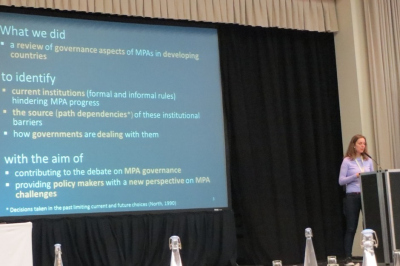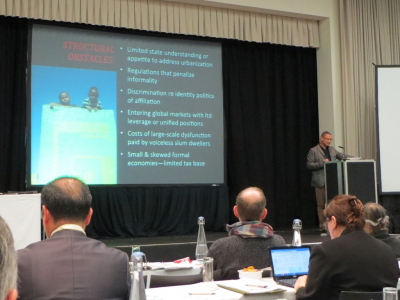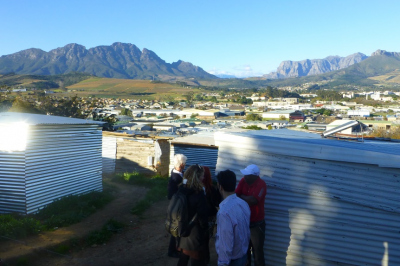Die Inhalte dieser Seite sind leider nicht auf Deutsch verfügbar.
Seitenpfad:
- Graduate School GLOMAR
- PhD student reports
- Conference Reports
- Conference Reports 2013
- Gabriela Weber de Morais
Gabriela Weber de Morais
Report of GLOMAR PhD student Gabriela Weber de Morais about her participation in the 19th annual International Sustainable Development Research Conference, Stellenbosch, South Africa, 1 - 3 July 2013
Shortly after my arrival in Stellenbosch, South Africa, for the 19th conference of the International Sustainable Development Research Society, I met another PhD student which shared with me the same motivation to attend the conference. Coming from developing countries and pursuing our PhDs in Europe, we felt both attracted to the conference by the fact that it would take place in South Africa and thus could offer us a global south perspective on sustainable development.
The conference took place between the 01 and 03 of July at the Spier Wine State, in Stellenbosch. Spier itself already applies sustainability concepts to its management and it is an important partner of the Sustainability Institute (http://www.sustainabilityinstitute.net/) which hosted the event in partnership with the School of Public Leadership of the Stellenbosch University. At the conference reception one could already tell that the cozy environment and the not so large number of participants (around 150 people) would allow for a fluid exchange of ideas.
The conference ran smoothly, bringing together both perspectives from the global north and the global south. It was interesting for me to learn about how sustainable development goals are being pursued by the South African government; especially because South Africa has some similar challenges (e.g. social inequalities) to the ones of Latin America (my regional focus of research). In one of the plenary sessions, issues related to urbanization in Africa were touched upon and it really felt like my objective of hearing about global south perspectives was being met.
However, there were more additional benefits I was not expecting. As the main theme of the conference was the transitions needed for sustainable development, there were several keynote speakers and panelists that emphasized the role of institutions (formal and informal rules) for achieving so. This approach was particularly useful for me since my theoretical framework deals with the persistence and change of rules related to the governance marine protected areas.
The session in which I presented my paper was also rewarding. It was about transitions in conservation and we had an interesting combination of participants from the five continents presenting our views on conservation mechanisms. In the end of our parallel session I also had the opportunity to talk and exchange contacts with researchers working with governance of coastal and marine areas in Europe and Australia.
On the last day of the conference we had a guided tour to an interesting project taking place in an informal settlement in Stellenbosch. The project named iShack aims at informing feasible strategies to upgrading infrastructure in informal settlements. It is a very good example on how work developed in the academia can benefit a community and inform policy making towards sustainability transitions. The day after the conference ended I visited the Sustainability Institute and learned more about its history and work. I came back to Bremen extremely inspired by all I have seen. My impression is that I gained not only from the global south perspective but also exchanged valuable thoughts we other researchers interested in the links between science and policy making for sustainable development. Finally, I am very grateful to MARUM and its Graduate School (GLOMAR), which I belong to, for financially supporting me to attend the conference and learn so much during my time in South Africa.
The conference took place between the 01 and 03 of July at the Spier Wine State, in Stellenbosch. Spier itself already applies sustainability concepts to its management and it is an important partner of the Sustainability Institute (http://www.sustainabilityinstitute.net/) which hosted the event in partnership with the School of Public Leadership of the Stellenbosch University. At the conference reception one could already tell that the cozy environment and the not so large number of participants (around 150 people) would allow for a fluid exchange of ideas.
The conference ran smoothly, bringing together both perspectives from the global north and the global south. It was interesting for me to learn about how sustainable development goals are being pursued by the South African government; especially because South Africa has some similar challenges (e.g. social inequalities) to the ones of Latin America (my regional focus of research). In one of the plenary sessions, issues related to urbanization in Africa were touched upon and it really felt like my objective of hearing about global south perspectives was being met.
However, there were more additional benefits I was not expecting. As the main theme of the conference was the transitions needed for sustainable development, there were several keynote speakers and panelists that emphasized the role of institutions (formal and informal rules) for achieving so. This approach was particularly useful for me since my theoretical framework deals with the persistence and change of rules related to the governance marine protected areas.
The session in which I presented my paper was also rewarding. It was about transitions in conservation and we had an interesting combination of participants from the five continents presenting our views on conservation mechanisms. In the end of our parallel session I also had the opportunity to talk and exchange contacts with researchers working with governance of coastal and marine areas in Europe and Australia.
On the last day of the conference we had a guided tour to an interesting project taking place in an informal settlement in Stellenbosch. The project named iShack aims at informing feasible strategies to upgrading infrastructure in informal settlements. It is a very good example on how work developed in the academia can benefit a community and inform policy making towards sustainability transitions. The day after the conference ended I visited the Sustainability Institute and learned more about its history and work. I came back to Bremen extremely inspired by all I have seen. My impression is that I gained not only from the global south perspective but also exchanged valuable thoughts we other researchers interested in the links between science and policy making for sustainable development. Finally, I am very grateful to MARUM and its Graduate School (GLOMAR), which I belong to, for financially supporting me to attend the conference and learn so much during my time in South Africa.





